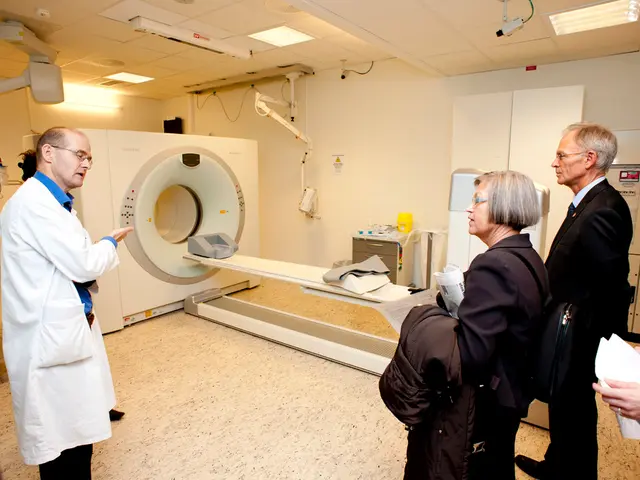Groundbreaking Advancement: Utilization of Stem Cells for Enhancing and Healing Brain Functions
==============================================================================================================
In the realm of medical research, stem cell therapy for brain health and repair is an exciting and rapidly evolving field. Countries like China and India, where regulations are lax or exploited, pose a risk of misuse, potentially causing harm rather than healing. However, in other nations like the US and UK, stem cell practices are strictly controlled to ensure safety, although this may limit patient access due to stringent approval processes.
As we continue to develop stem cell therapy for neurodegenerative diseases such as Alzheimer's and Parkinson's, there are several areas of focus that researchers predict will shape the future direction. One significant area is expanding stem cell sources, with novel techniques for harvesting stem cells from tissues like fat and skin being explored.
Current advancements focus primarily on mesenchymal stem cells (MSCs), induced pluripotent stem cells (iPSCs), and their derived products like exosomes. MSCs, especially from bone marrow or adipose tissue, are favoured for their neuroprotective and immunomodulatory properties with minimal tumorigenic risk. Exosomes derived from MSCs can modulate microglial activation to reduce neuroinflammation and amyloid-beta (Aβ) deposition in Alzheimer's, promote autophagy, and improve mitochondrial function, which is critical for neuronal survival.
iPSCs offer the ability to differentiate into any cell type and are being used to create disease models, test regenerative therapies, and develop personalized treatments. Their capacity for personalized cell therapy holds promise for tailored interventions in both Parkinson's and Alzheimer's disease.
Future prospects include personalized cell therapies, where patient-derived iPSCs are used to develop autologous treatments that minimize immune rejection and optimize regenerative potential for neurodegenerative diseases. Another crucial area is improving therapy accessibility, as variations in legislation across different regions globally pose significant challenges in making it universal.
The potential impact of stem cell therapy on brain health and repair is vast and multi-faceted, with both direct and indirect economic implications. Navigating these regulations requires expertise not just in scientific knowledge but also in legal comprehension. Policies promoting wider insurance coverage for these therapies could help address concerns about therapy accessibility.
The role of Stem Cell Legislation cannot be undermined in ensuring ethical practices while channelising resources towards effective research areas that promise patient benefits. In the UK, stem cell therapy is highly permissive and encouraging, while in Japan, rapid regulatory changes are being made to encourage research in this field.
While the promise of healing is alluring, many patients have expressed concerns about therapy accessibility. The rise of personalised medicine could inadvertently bring about a seismic shift in our healthcare infrastructure and economic landscape. The need for continued dialogue among scientists, ethicists, lawmakers, and stakeholders cannot be understated as we strive to create an environment that fosters both innovation and safety.
In conclusion, stem cell therapy—especially via MSCs, iPSC-derived cells, and their exosomes—represents a rapidly evolving and promising frontier for treating Alzheimer's and Parkinson's diseases, aiming to repair damaged neuronal circuits, reduce pathological protein accumulation, and modulate neuroinflammation. Future personalized and cell-free approaches are likely to enhance therapeutic outcomes. As we navigate through uncharted waters towards a healthier future powered by stem cells, it's clear that this field holds immense potential but also presents unique challenges.
- The field of science, particularly stem cell therapy for brain health and repair, is a rapidly evolving area, with countries like China and India, where regulations are lax or exploited, posing a risk of misuse.
- In the realm of education, understanding and mastering areas such as expanding stem cell sources, MSCs, iPSCs, and their derived products like exosomes, are crucial for the future direction of medical-conditions like Alzheimer's and Parkinson's.
- News about personalized cell therapies, where patient-derived iPSCs are used to develop autologous treatments, could dramatically reshape the health-and-wellness landscape, especially for neurodegenerative disorders like Parkinson's and Alzheimer's disease.
- Lifestyle adjustments may be necessary as a result of the economic implications brought about by the potential impact of stem cell therapy on brain health and repair, and policies promoting wider insurance coverage for these therapies could help address concerns about affordability and accessibility.
- In the realm of technology, improvements in stem cell therapy accessibility could bring about a seismic shift, requiring dialogue among scientists, ethicists, lawmakers, and stakeholders to foster both innovation and safety, ensuring ethical practices while channeling resources towards effective research areas.




